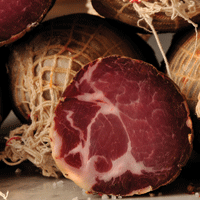Family tradition and prized product boosts the Pingue brand profile
“When I was young there was one kind of prosciutto,” Bill Buford writes in An Amateur’s Adventures as Kitchen Slave, Line Cook, Pasta-Maker and Apprentice to a Dante-Quoting Butcher in Tuscany. “It was made in winter by hand and aged for two years. It was sweet when you smelled it. A profound perfume.” He continues: “To age a prosciutto is a subtle business.”
As the GM of Niagara Food Specialties, whose Pingue-brand prosciutto is at the heart of the family run business, Mario Pingue Jr. knows Buford’s butcher is bang on. “My father always made prosciutto at home — he was in the restaurant business. His place was called the Roman Courts, and we’re here today, as Niagara Food Specialties, by customer demand,” explains Pingue Jr.
“In the ’70s you couldn’t get good Parma Ham, San Daniele or prosciutto in Canada,” Pingue Jr. says of his product, the former two of which have “protected designation of origin” (denominazione d’origine protetta, DOP) product specifications in Italy.
So, the story of Ontario’s Niagara Food Specialties and its prosciutto began with a light-bulb moment. “My dad catered to the Italian community in Niagara, and many people he catered to had been to our house and tasted his homemade prosciutto,” says Pingue Jr. Many of those Niagara locals booked events at Pingue’s Roman Courts banquet hall and restaurant. “And they’d say, ‘Mario … everything was excellent, but the prosciutto wasn’t like the one we had at your house.”
It was 1975, a time when specialty meats, in particular prosciutto, were seldom served at foodservice operations. There were, however, chefs and foodservice operators craving dry-cured ham. Seizing an opportunity, the Pingue patriarch transformed his sideline business — homemade prosciutto — selling it to restaurants across Niagara and eventually building a customer base that extends to Southern Ontario’s southern Golden Horseshoe region and beyond.
Making perfect prosciutto takes time, lots of love, the right ingredients — naturally raised, vegetarian hogs and sea salt — and perfect conditions. Temperature, humidity and light needs to be precisely maintained in a “cantina” or cold cellar. “My dad’s banquet hall was in an old dairy run by a coal-fired steam generator. The coal chute and storage area gave us a 40-foot drop from the parking lot,” recalls Pingue. “Needless to say, four stories below grade, my dad made it his cantina … being under the frost line; it was cold year-round.”
Today, Niagara Food Specialties is a success thanks, in part, to several industry people who championed Pingue’s products. “Back in the mid-’80s a lot of wineries were putting in restaurants, particularly Vineland Estates and Kingston Cellars. Chef Michael Olson, then of Cave Spring Cellars’ On The Twenty Restaurant, approached us for prosciutto a number of times,” says Pingue Jr. It wasn’t long after, that Pingue’s cured meats were being served at a handful of restos from Vineland — at chef Marc Picone’s restaurant — to various restaurants in Niagara-On-The-Lake, Ont. Another vociferous early supporter was Michael Bonacini who invited Pingue Sr. to demo his products for O&B chef/managers. “Anthony Walsh, Jason Bangerter had a taste — that day I kept hearing ‘wow, I can’t believe how good this stuff is,’” recalls Pingue Jr., humbly. “We’re by no means big; in the world of industrial food processing we’re a drop in the ocean.”
Humble or not, the success of the company, says Jordan Holley, executive chef at Social Restaurant and Lounge in Ottawa, “is based on time-honoured techniques. Mario trained with some of the best charcutiers in Italy and brought that knowledge back to Canada.”
The company has gone from the back kitchen to the charcuterie boards of hundreds of restaurants since 2003 when Mario Jr. and his brother Fernando — the company’s production manager — stepped in to run the business. Pingue Jr. prefers to keep sales and revenue private but explained its growth. When the business was a sideline in the ’70s his father produced about six hams per week; today, son Mario says, “We’re probably selling 70 hams per week in addition to the other cuts of the animal.” Market share has grown, too, as the company boasts more than 200 clients, with Niagara Food Specialties doing business in Toronto, Kingston, Ottawa, Waterloo and Guelph. To this day, Pingue Jr. rolls up his sleeves, salting the meat, deboning or packaging the product for customers. “Mario is an extremely passionate man, he’s still the one in there, massaging the hams and cleaning the meat,” says chef Holley who serves flavourful prosciutto, Nduja sausages, capocollo, bresaola and fennel sausages made by the Niagara-based business.
Flavour has been captured by a unique process the Pingues mastered. “We’re using certified organic pork — our minimum standard is naturally raised and certified humanely, treated without antibiotics,” says Pingue Jr. “We make certain our hogs aren’t raised in industrial food factories.” Pingue’s hogs have a minimum age and weight requirement. “A minimum of 10 to 16 months before going to market, whereas commodity pork is raised to four months of age,” Pingue Jr. explains. The end result — when it comes to prosciutto — is a heavier fat cap, better marbling, darker colour and, “a better flavour profile.” Commodity pork by contrast, says Pingue Jr., is lean, very subtle in flavour, very pale in colour. “In the ’70s and ’80s, they were marketing pork as ‘the other white meat.’” Another key ingredient in making prosciutto is salt-preserving. “We’re nitrate- and phosphate-free,” says the GM, aware of today’s health-conscious diners.
Meanwhile, the company is also community-conscious. It donates to Project Share, the local food bank and contributes to the Niagara Foundation, which offers endowment funds, grants and philanthropic partnerships in Niagara. The Pingue brothers are founding members of Slow Food Niagara, promoting sustainable locals foods, and they work with Niagara Food Co-operative, whose aim is to bring consumers and small, farm-gate producers together. “We also reach out to Niagara College and George Brown. We get involved every term — it’s more scholastic — to speak about what we’re doing, what’s going on in the industry.”
As for the future, Pingue Jr., who currently employs eight full- time employees and four part-timers, is hoping to expand from Ontario across Canada and the U.S. “In five years I’d like to see us in a new facility and approved by the Canadian Food Inspection Agency to sell to the rest of Canada and the States.”




















